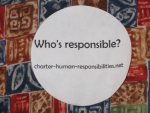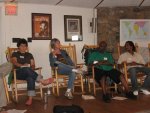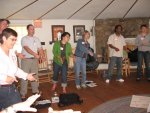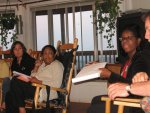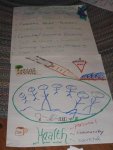
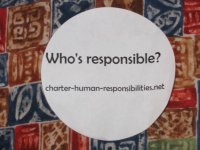
The Solidarity Economy and Responsibility
par Nina GREGG
Thèmes forts liés :
Economie et Responsabilité .
Thèmes généraux liés :
Économie .
Twenty-four activists and educators from five states met for two days at the Highlander Research and Education Center in New Market, Tennessee to learn about the Solidarity Economy and build relationships for future work together. The group included people working on immigrant rights, sustainability education, living wages, police brutality, the cradle to prison pipeline, using art for social change, alternatives to militarism, community building, sustainable economic development, youth leadership and more.
The workshop was co-sponsored by the Highlander Center, the Appalachian Community Fund, the Charter of Human Responsibilities and the Center for Popular Economics.
After introductions and a session on how each participant’s work related to the economy, Emily Kawano and Amit Basole from the Center for Popular Economics led the group in discussion of ‘What’s the Economy for ?’ and reflection on how well the economy is doing in meeting human needs.
| Workshop participants also answered the question ‘Who’s responsible for the economy ?’ | Asking the question generated substantive discussion. |
Highlander’s commitment to popular education and cultural work was evident in this workshop, as the group sang together and created graphic images of the economy we’d like to see.
A session describing the solidarity economy and the global solidarity economy movement encouraged workshop participants to consider how to build a fair, democratic and sustainable economy.
We noted that some of the elements of a solidarity economy are already present in cooperative enterprises, credit unions, and worker-owned businesses. Linking these organizations through the new US Solidarity Economy Network can strengthen existing efforts through sharing skills and knowledge and also help build the solidarity economy movement as an alternative to mainstream economic commitments to markets and profits.
The group learned about Austin Polytechnical Academy, an urban high school in Chicago that is a unique partnership between the city, the school, and area businesses that was achieved through the work of the Center for Labor and Community Research, a local NGO. The school aims to educate and train young people for employment and leadership in high-road manufacturing and in so doing maintain and strengthen the manufacturing sector in Chicago and good employment opportunities.
The workshop also considered the concepts of social wealth and The Commons (see www.onthecommons.org and www.peri.umass.edu/fsw ) ; and participatory budgeting (www.participatorybudgeting.org ).
Next steps
Workshop participants are committed to sharing what they learned and staying in contact. One group has already scheduled a follow-up meeting to include new people.
The US Solidarity Economy Network will hold an inaugural conference December 4-6, 2008 in New Orleans. USSEN chose to hold the conference in New Orleans “because it symbolizes the failure of the current economic model - growing inequality and poverty, lack of public investment, and public agencies built on cronyism rather than competence. We chose New Orleans as an act of solidarity with the people who are still struggling everyday to return, reclaim, rebuild, and renew their lives and communities.” CHR is continuing to work with SEN in the coming months.
About the workshop sponsors
Highlander Research and Education Center
Highlander has a 75-year history working with community groups on social justice issues in Appalachia and the US South, dating from labor organizing in the 1930s and 1940s, the civil rights movement in the 1950s and 1960s, land use, environmental and participatory education movements in the 1970s and 1980s, and immigrant, youth and democracy movements of the 1990s and today.
Appalachian Community Fund
The Appalachian Community Fund (ACF) is a publicly supported, non-profit grantmaking organization that provides resources and support to grassroots organizations working to overcome the underlying causes of poverty and injustice in Central Appalachia (East Tennessee, Eastern Kentucky, Southwest Virginia and West Virginia). We pool resources from a range of sources including individuals, businesses, and foundations to support community-led efforts and movement for social change, to support the training and leadership development necessary to strengthen the work in our region, and to cultivate the conditions for lasting, long-term change to be possible.
Center for Popular Economics
The Center for Popular Economics is a non-profit collective of political economists based in Amherst, MA. Since our founding in 1978, thousands of people have participated in our workshops and institutes. Our programs and publications simplify the economy and put useful economic tools in the hands of people fighting for social and economic justice. We examine root causes of economic inequality and injustice including systems of oppression based on race, class, gender, nation and ethnicity.
Charter of Human Responsibilities
The Charter of Human Responsibilities is an international project with an ambitious and hopeful objective : mobilizing people to exercise our individual and collective responsibilities to one another and the planet. The CHR invites us to redefine responsibility in our communities, organizations and workplaces at a time when our interdependence has become both inevitable and necessary. CHR provides both a pre-text and a text. The pre-text asserts a universal principle of responsibility and encourages reflection on the meanings of individual and collective responsibility. The text challenges us to be intentional and reflective in our practices and actions. Around the world groups and organizations are taking inspiration from the Charter to initiate programs and activities addressing issues and concerns in their communities.

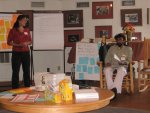
Emily Kawano et Amit Basole menant l’atelier depuis le Center for Popular Economics
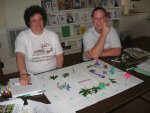
Elaboration d’une nouvelle vision de l’économie (Monica Hernandez et Randal Pfleger)
